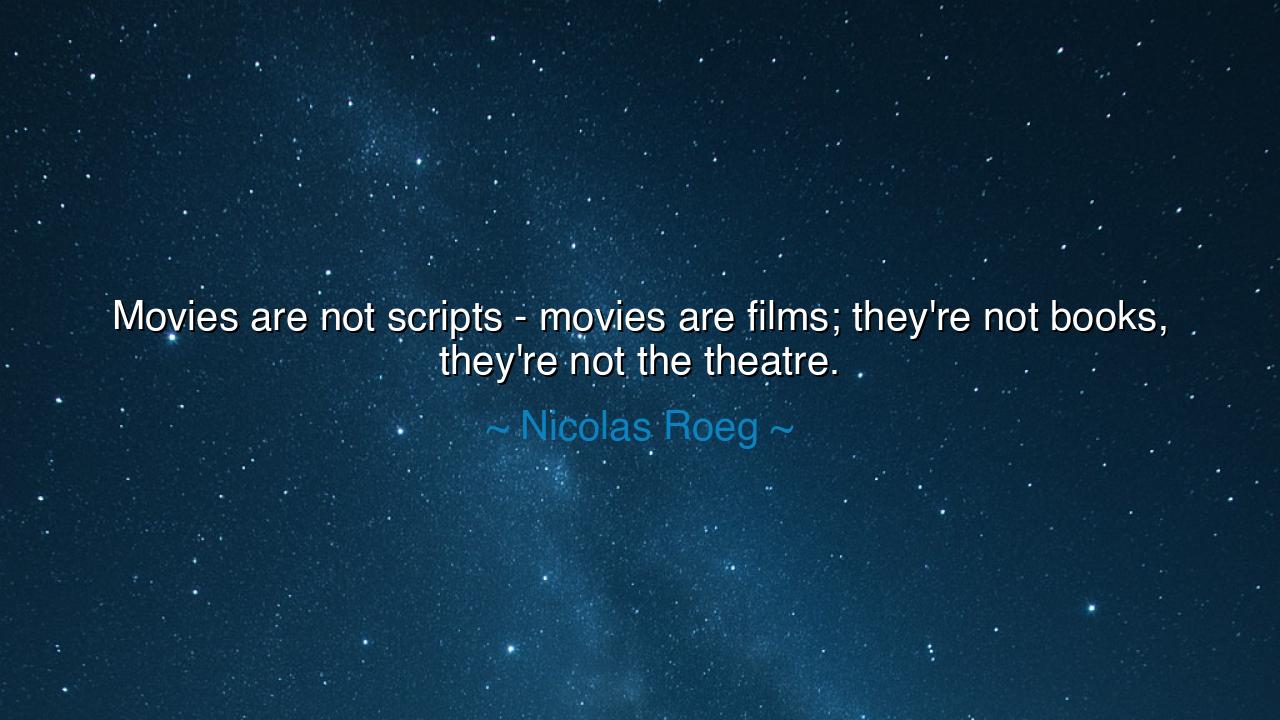
Movies are not scripts - movies are films; they're not books






Hear the words of Nicolas Roeg, the visionary who bent time and memory upon the screen, who declared: “Movies are not scripts—movies are films; they’re not books, they’re not the theatre.” In this utterance, he calls us to remember the unique essence of cinema. Too often do men confuse one art with another, weighing the silver screen against the stage, or judging its value by the written word. Roeg, with a prophet’s voice, insists that movies are their own creation, neither bound by the logic of prose nor the traditions of theatre, but alive in their own right, formed of images, rhythm, and sound.
The meaning of this saying lies in the defense of cinema’s identity. A script is but the skeleton; it is a guide, a foundation, but not the finished body. A book lives in the imagination, carried by words and ideas. The theatre lives in presence, in the breath and voice of actors before an audience. But film—film is a different creature altogether. It speaks through the interplay of sight and sound, of editing and juxtaposition, of silence as much as dialogue. To confuse it with other arts is to miss its power. Roeg reminds us that cinema must be approached on its own terms, not as an imitation of something else.
The ancients, though they knew not cinema, understood this principle. When Homer sang the Iliad, his epic was not the same as a carved tablet, nor the same as a staged performance. It was song, oral art, born for the ear, alive only in its own form. Later, when Aeschylus wrote tragedies, he did not try to recreate the song of Homer, but invented something new—the theatre, where chorus, mask, and action merged. So too with film: it is not meant to be a book upon a screen, nor a play bound in celluloid. It is its own art, requiring its own measure.
History gives us many witnesses to this truth. Consider Sergei Eisenstein, the Soviet filmmaker, who in Battleship Potemkin discovered that editing itself could be art. The cutting of shots—the rhythm of images colliding—created emotions and meanings no book or stage play could capture. In the famous “Odessa Steps” sequence, terror and chaos unfolded not through words or theatrical presence, but through the pure language of cinema: montage, motion, silence broken by gunfire. Here Roeg’s words ring true: movies are films, alive in the grammar of sight and sound, not the borrowed tongues of other arts.
The lesson for us is to honor each art form for what it is, not to reduce one to the measure of another. A book must be read; a play must be witnessed; a film must be seen and heard, felt through its rhythm and imagery. To judge a movie only by its script is to see the bones without the flesh. To judge it as a book is to forget the image. To judge it as theatre is to ignore the edit, the camera’s gaze, the intimacy of the lens. Each art has its sacred language; to confuse them is to misunderstand them.
Practical action follows: when you watch a film, do not ask merely whether the dialogue is clever or the script strong. Ask also: How did the camera speak? How did silence shape the scene? What did the cut between images make me feel? Train your eyes and ears to see the language of cinema itself, so that you may experience it as Roeg intended: not as book, not as play, but as film. And if you create, let your art honor the medium you use—do not force it into another’s mold, but let it breathe in its own life.
So let the words of Nicolas Roeg endure as a creed for filmmakers and audiences alike. Movies are films—they live by their own grammar, their own heartbeat, their own mystery. They are not scripts, though they may begin as words. They are not books, though they may tell stories. They are not theatre, though they may carry drama. They are their own temple of light and shadow. Let us enter that temple with reverence, and let us learn its language, that we may be moved not by comparison, but by the power of cinema itself.






AAdministratorAdministrator
Welcome, honored guests. Please leave a comment, we will respond soon